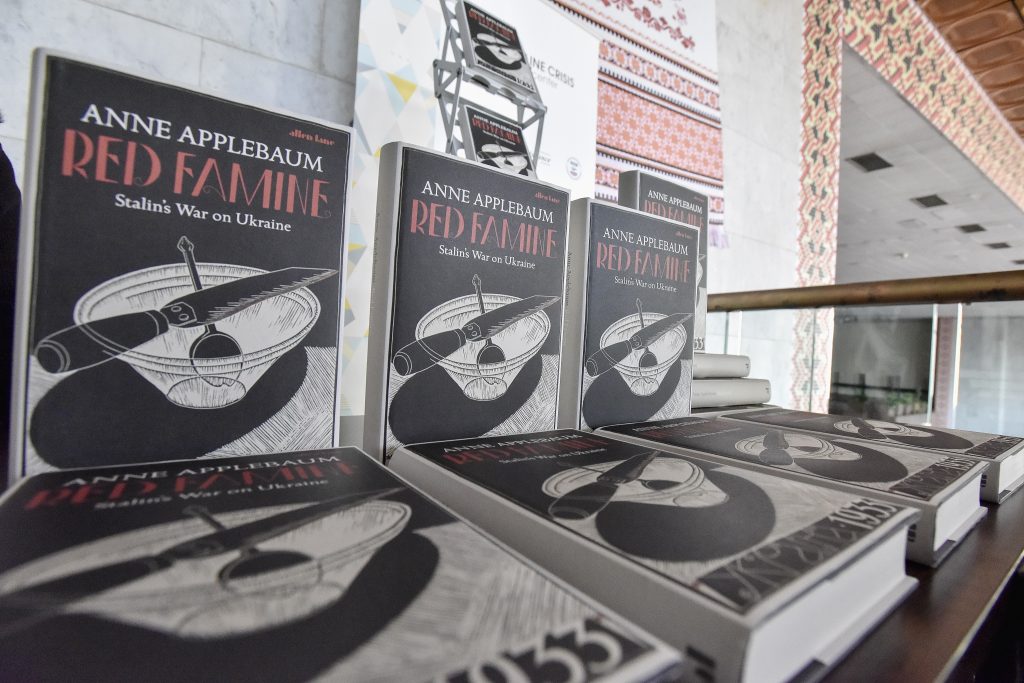In the end of November, Ukrainians commemorate their compatriots who died of an artificial hunger, the Holodomor, in 1932-1933. On the eve of the tragic anniversary, Anne Applebaum, a prominent American historian, presents her book about the Holodomor in Kyiv.
Ms. Applebaum is the former member of “The Washington Post” editorial board (2002-2006); the Pulitzer Prize winner for the book ’Gulag: A History’ (2004); a regular columnist for the Washington Post and a Professor of Practice at the London School of Economics. “Red Famine: Stalin’s War on Ukraine”, her newest book, begins with the Ukrainian revolution of 1917 and ends with the Ukrainian famine of 1932-33. Anne Applebaum argues that the famine was not an unintended fault of Soviet “collectivization” policy: Stalin used the famine to crush growing dissent among the peasants, for fear that any dissent and dissident opinions in Ukraine, moreover, connected with Ukrainian national idea, were a vital threat to the Soviet Union. At the presentation at Ukraine Crisis Media Center Anne Applebaum tells about her work.
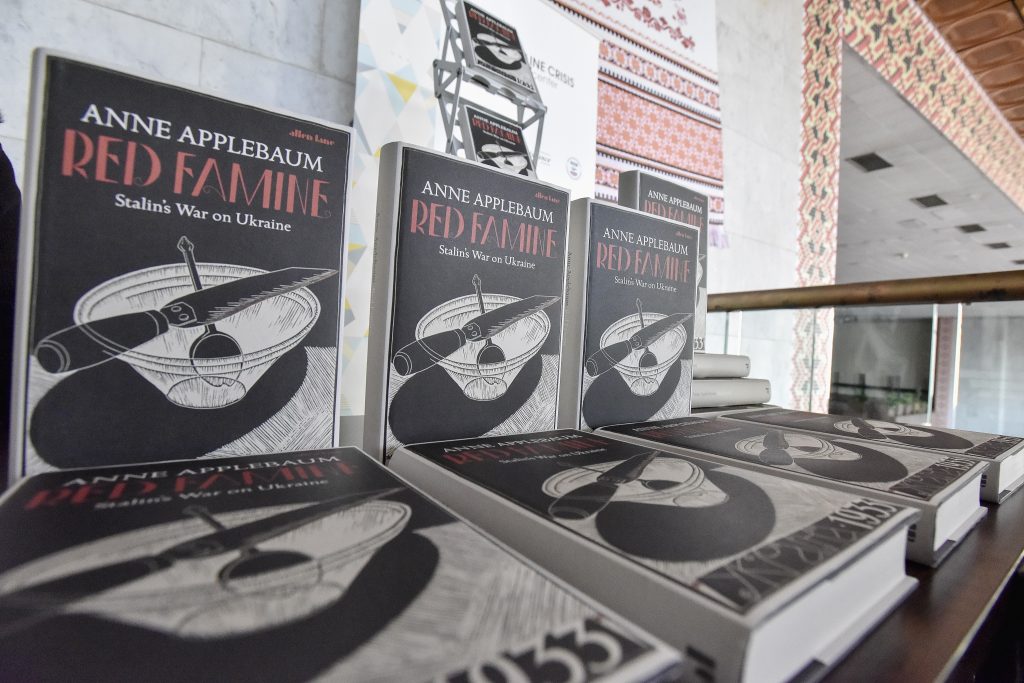
Andriy Kulykov, co-founder of “Hromadske Radio”: Once I was told that to access the value of the book you should start from the end, so I read the final phrase of the book, and it says: ‘As a nation, Ukrainians know what had happened in the XX century, and this knowledge can help them shape their future”. Why not “will help”?
Anne Applebaum: There is a lot of examples of people not learning from the past. The human race is sometimes destined to repeat the same mistakes over and over again, and we just can hope that it won’t happen here. I know that there is a lot of conversations here, sometimes about museums to the famine and memorials to the famine, and there is a legitimate argument to get the UN recognition to the famine as a genocide and so on. But there was really one thing that Ukrainians could do to memorialize the famine, to honor the victims, and that would be to create a state where nothing like that could happen again. That means a state in which nobody is able to use ideology to justify violence, a state which seeks to unify people and not to divide them; a state which ensures neutrality of state institutions, so that you have neutral civil service, so that you have independent judiciary, so that you have very strong and independent media. All of these things help to ensure that you remain the kind of country where that cannot happen. For me this is what I hope is the lesson from the famine.
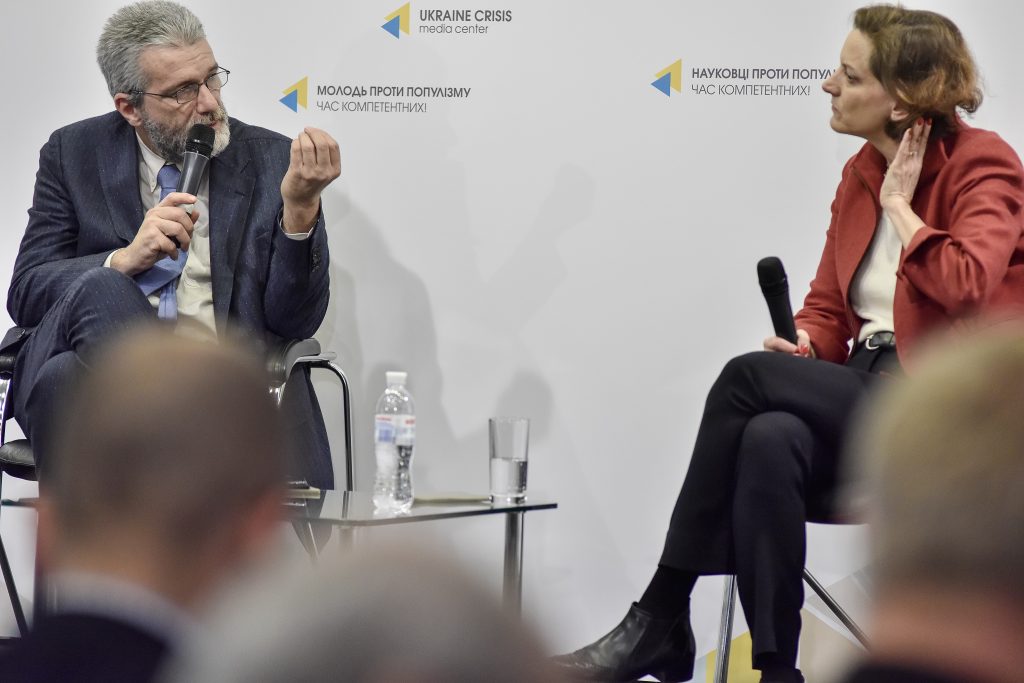
Andriy Kukykov: How the history can help us? Is it meant to scare us and say we should not ever think of repeating those hard times? Are there any lessons to be drawn, as the current system is so different of what was then during Stalin times?
Anne Applebaum: Yes, I think it’s a mistake to look at history as a series of lessons, it’s not really that. It’s not that there is exact parallel between the past, and now I don’t believe we live through a second Soviet Union, and I do not think that Putin is Stalin etc. To say so makes an exaggeration, it makes really hard to understand him. You know, you need to understand him from what he is. It’s even a mistake to talk about fascism and bolshevism in our time as if they were exactly the same thing that they were in 1930s. But the study of history does teach you to look at how people behave, how institutions work, for example, what happens in the society where you don’t have independent courts and independent media, where you have a one-party state and no political opposition – you can see what that looks like and you can draw conclusions. History doesn’t give you blueprint, it doesn’t say “you must do X, Y, Z”, but it can give you some negative stories, things to try and avoid, some hints about moving forward. That’s the way to look at it. I don’t think you can expect to read a history book and get a plan for the future. And in fact I was worried when people all start asking me about the future, like “what will happen next”. If I knew that I would be working at the stock market, if I could guess what will happen next week. I don’t think you should look at history that simplisticly, just learning how people think and behave. There is of course a human tendency towards authoritarianism, towards dictatorship; there is a reason why totalitarian systems succeed. There is a desire for stability, people have the desire for authority; the reason why these kinds of system are attractive, and I think it’s important to understand about the famine for example not only who were the victims but also who were the perpetrators, why did people carry it out. And some of the perpetrators of course … Maybe the right word for them is not “perpetrators”, because they were often people who were very hungry and very frightened themselves, but they were Ukrainians who were part of these activist teams who went to the villages to requisition people’s grain – what led them, how did they think. These are all important aspects of the story to understand.
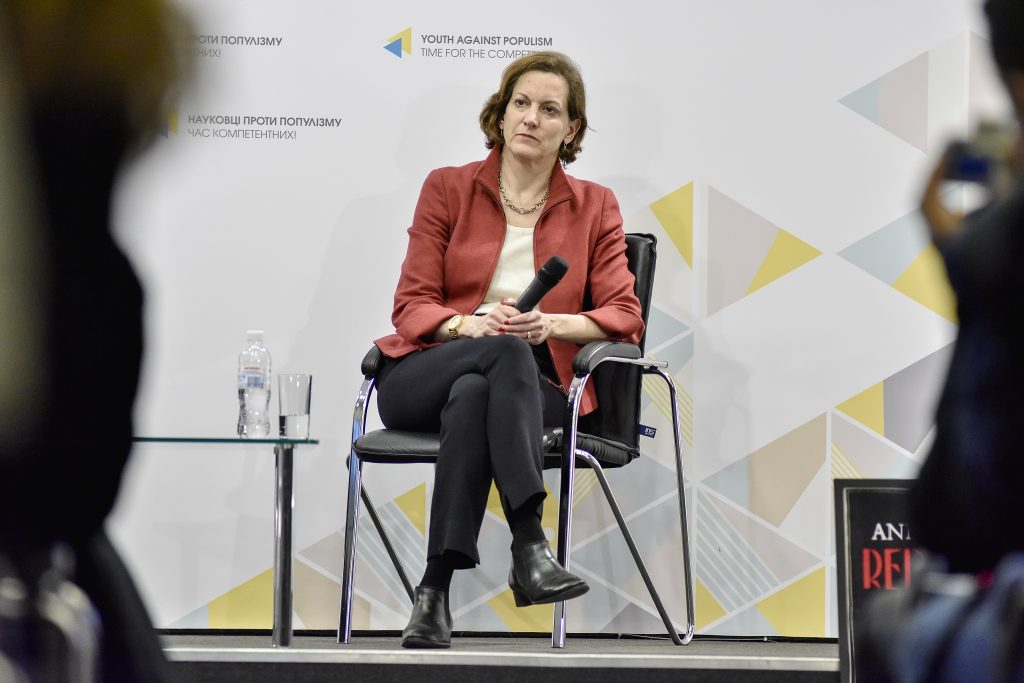
I once talked to a respected Ukrainian historian about Holodomor and all this, and I asked him: is there a thing that we should not know about Holodomor? He thought and said: “Yes. For instance, the names of the people who had to resort to cannibalism for obvious reasons”. What’s your take? Is there anything that we should not try to discover?
It’s not so much about knowing their names, but it is true that there are things that people do when they are so hungry as to be insane, that you don’t want their children to be responsible for them, you don’t want that shame to go to the next generation. I would put it a little bit differently. I wouldn’t say there are things we shouldn’t know, but there are maybe judgements we should withhold. I am very reluctant to judge people of the past for the things they may have done in the situation in which I can’t imagine myself being. Try to imagine being so hungry that you cannot see and understand right or wrong anymore. Or imagine being in a situation when you see your children starving to death and you can do nothing about it. What kinds of moral judgements and decisions do you make at that time? Be careful not to judge based on our current circumstances – when we’re all safe, and we have enough food and we are able to live in a normal way – making judgements about the past, about the situation we can’t really imagine.
Andriy Kulykov: The title of the book is “Red Famine Stalin’s War on Ukraine”. Some people might say that Stalin’s war on Ukraine was not limited to famine, and some people might say that it was not Stalin’s war on Ukraine, this was either Russia’s, or Moscow’s, or the System’s war on Ukraine. What’s the reason for the title?
Anne Applebaum: The book is not just about the famine. When I began working on the famine I originally had the optimistic idea that is going to be an easy book to write because it is my last book among books about different countries about a long period of time – Poland, Hungary and so on between 1945 and 1956. And this is two years about one country, it seemed to be easy. Then as I began working on the year 1932, and I began reading what Stalin was writing that year, and I began to look at the correspondence he had with Ukrainian communists and so on, I realized that at this moment in 1932 which is just about to make a series of decisions which lead to… like there is an all-Soviet famine, but he makes decisions that lead to the famine becoming worse inside Ukraine. Stalin is speaking excessively about the civil war. He is talking about 1918, he is worried about “Pelurovtsy”, agents of Pilsudsky that he sees everywhere in Ukraine; he is remembering Pilsudsky’s intervention in Ukraine in 1919-1920. And I understood that in Stalin’s mind (Stalin of course played an important role in Ukraine as a commissar of nationalities during the civil war) .. we now look back at history we think that 1930s is a one story and 1919 that’s a completely different story. But for Stalin it’s the same story. He lived through them both, they are the part of his memory and people around him. And I understood that this book has to begin in 1917 and that it has to explain Soviet policy towards Ukraine throughout that period, because that’s how you understand the justification for the famine, and you start to understand that for Stalin Ukraine presents an existential problem. It’s not just one of the republics, it is a special problem for Stalin, because he believes that chaos and any rejection of bolshevism in Ukraine could have an effect in Moscow, which had almost happened in 1918, and he fears that the fate of the revolution is not just in Moscow, it is also partly in Kyiv. That is why I wanted to express in the title that the book is more than about 1932, it starts in 1917, and actually the book is an argument that begins then. I could have written “the Bolshevic Party’s War on Ukraine”, but “Stalin’s war on Ukraine” is shorter and sounds better.
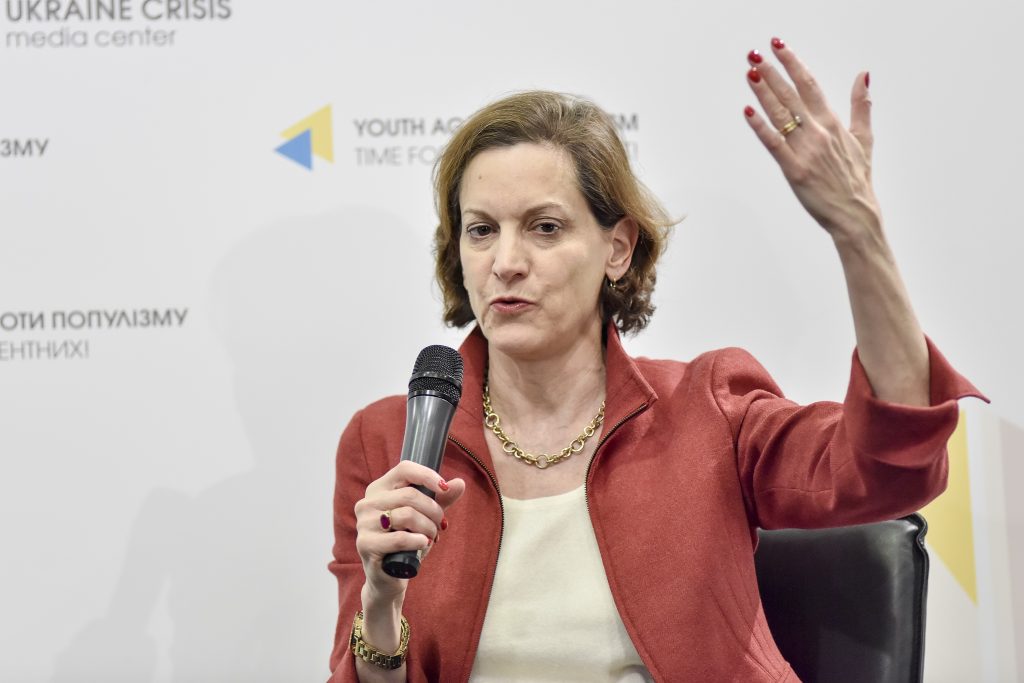
I don’t think it would be fair to write “Russia’s war on Ukraine”, because this was not, although you can see Stalin in many ways as having inherited the legacy of imperial Russia, and you can certainly argue for example that now Putin thinks very much like imperial Russia, you can see this line, Stalin’s reasons for being obsessed with Ukraine were not only imperial, they were also to do about the Bolshevic ideology. And so I think it was the Soviet Union’s war on Ukraine, and the goal of the famine from Stalin’s point of view was that it helped him in the process of Sovietizing Ukraine. The idea was to weaken the peasantry, to prevent future rebellions. He remembered the rebellion of 1918, there had been another rebellion which was also very carefully described in the book, in 1930. It was everywhere, the peasants fought, and collectivization went on particularly bad in Ukraine, and there was a particular number of incidents, there were some armed uprisings. And to weaken this peasant national movement because he was afraid of its repercussions in Moscow. And I should also say that the famine was of course a part of this story, and a part of the story that followed immediately afterwards was his attack on Ukrainian national intelligency – writers, artists, museum curators, historians, also the Urkrainian Communist party.
Andriy Kulykov: This brings me to another quote from your book. I opened it randomly and the first line that sprang to my eyes was “…people with swollen legs”, and then the description of the state in which the people were during the famine. And the second line was “…the OGPU finally detained Hryshevsky during his trip to Moscow in 1931. How much detail do you put to historical personalities others than Stalin?
The book has a lot of other historic personalities. Hryshevsky is a kind of character in the book, because he appears in 1917, and then his return to Ukraine in the period of the so-called Ukrainiazation [Soviet policy encouraging national culture in the Soviet republics, including Ukraine, in 1920s – UCMC], and his final exile and death. He appears in the book as one of the emblematic national intellectual class that existed in those years. There is a number of other personalities, including Ukrainian communists.
There are three chapters that are specifically about the famine and what happened: how did the searchers work, what happened on the ground, what happened immediately afterwards, how did people survive, what were the tactics they used. Most chapters were very much based on memoirs and oral stories, in particular those spectacular oral histories that were collected towards the end of the Soviet Union and at the beginning of the era of Ukraine’s independence. There is a lot of quotations from people who describe what it was like to be in the Ukrainian countryside at that time.
Andriy Kulykov: Your prize-winner book “GULAG. A HISTORY” has a history. I saw an impressing list of references in the end. Is this a history or the history?
Anne Applebaum: I’ll never claim that anything is ever the history, I mean there will be other people who write histories. I’m not trying to write something that ends the conversation. I want my book to be the beginning of the conversation.
Andriy Kulykov: Do you feel you left some questions unanswered?
Anne Applebaum: I think there are many questions that are not answered, for example, what happened to different ethnic groups during the famine. I touch on that a little bit, about the German-speaking community in Ukraine, and a little bit about Jews, but I think there is more work to do on that. There is more work you can do on famine in the cities, on Ukrainian communist party.
Also I should say to write a general book like I have written you need a lot of other work to have been done. It wouldn’t have been possible unless there had been a really decade-worth work in Ukrainian archives, in Russian archives – some by a few good Western historians, for instance, Terry Martin and Timothy Snyder, but also this generation of very good and expert Ukrainian historians all of whom I quote. Some of them helped me with the book, they would direct me to documents, archives, their own works – they were incredibly supportive. And throughout the text I try to give a lot of credit to other people who have done work on particular issues in the archives. I can Ukraine can be proud of a lot of material, historical monographs, or collections of documents and stories that have been published. My problem in writing this book was never the lack of information – you had just to sort through and decide which stories to use. I don’t know whether it’s understood well in Ukraine – how much there is, how much has been done, how good it is and how very open your archives are, and what a good use people make of them.
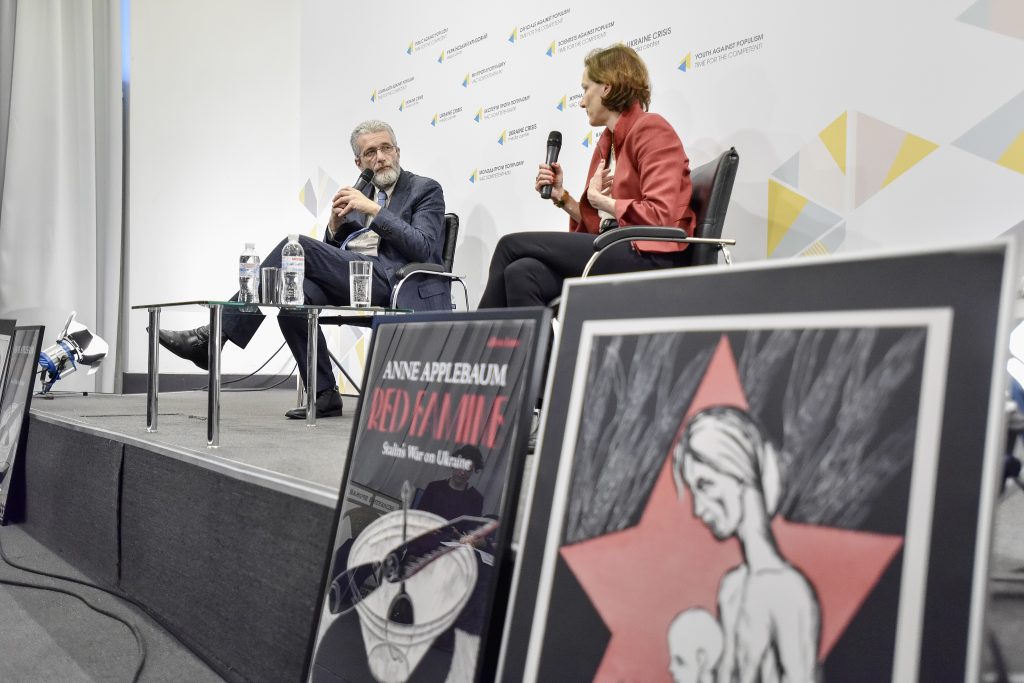
Andriy Kulykov: What was your biggest personal discovery when you were writing this book?
Anne Applebaum: An important intellectual discovery was the one that in Stalin’s mind all this was an extension of the civil war. We all knew what had happened, but putting it into this broader narrative and broader context was for me that explained it in a way that I haven’t really understood it before.
Andriy Kulykov: And what was your biggest personal impression? You are a “hardened” researcher, haven written about GULAG and then the crush on Eastern Europe until 1956. But maybe some things that you came across during this research were not happening then?
Anne Applebaum: Among the three history books I wrote this one was the most difficult, and partly – because it is an awful story. When you read about the GULAG, very often you’re reading the memoirs of intellectuals, or writers, or people who have lived through it and drawn some lessons from it, whether it’s Solzhenitsyn or Ginzburg. These are people who emerge from some terrible experiences, but then they had something eloquent to say. When you are reading about the famine, you are reading these horrible stories of semi-literate peasants, and there is nothing redeeming at all. The stories, as a friend of mine said, are a little bit like stories of Holocaust. These are really awful stories about children and parents seeing their children starving and making some kind of extreme decisions about what to do with them. These are unbearable, unwritable stories.
You referred to the epilogue of my book. When writing the end of it, I wrote several different versions of that. Some of the early versions were… not negative, but when you try to write the history of Holodomor, there is no happy ending, there is nothing good you can say at the end. And then I realized that of course the Holodomor has no happy ending, there is no redeeming lesson, no uplifling message – nothing. But the history of Ukraine is not a tragedy. The famine in the sense that Stalin intended it did not succeed, the purge of intellectuals did not succeed: you are here, your language and your culture are still here, you have recreated your country – this is a positive story.
Andriy Kulykov: You said that famine was a sort of continuation of civil war – another embodiment of the civil war. When did this war end, and has it?
Anne Applebaum: By the civil war I meant the Bolsheviks attempt to impose their ideology on this very large country, and they imposed it using extreme forms of violence that people had not expected. I think we can say it ended in 1991.
Andriy Kulykov: There is also a view that during the Second World War on the territory of USSR, apart of German-Soviet confrontation, there was a civil war going on, with the Soviet system on the one side and national liberation movements of different peoples on the other side.
Anne Applebaum: That is certainly true here, and it was more or less true in a number of other republics as well. The situation of Ukraine towards the end of the II WW was something like the situation of Ukraine in 1918 and 1919 – there were a lot of people and different groups fighting for power, particularly in Western Ukraine. So yes, there was a kind of civil war going on then.
Andriy Kulykov: Can you imagine someone creating fake news about your book? Where are the vulnerabilities?
Anne Applebaum: I thought of this and one of my great surprises is that so far nobody has done it. Actually when writing the book I tried to consider what kind of criticism might be from other historians and also from Russian government which has tried to tell a very different story about Ukraine and its history. It’s important to know that the current Russian government has decided to inherit the historical legacy of the Soviet Union which it doesn’t have to do – I mean if Russia wanted to see itself as something new, it could redefine itself in a different way. Notice that for 100 anniversary of the Bolshevik revolution there is no major celebration: they are selective about what issues they choose and which ones they don’t.
I can imagine the criticism of the book that says what the old critical arguments about the Holodomor say – that “it’s a bunch of Ukrainian Nazis thought up this fake story and then they tried to perpetuate it”. There is a more sophisticated argument that will be made by Western historians (no one has done in yet, but I think they will): that the famine was an all-Soviet famine and it was the result of a mistake and chaos of the collectivization, and that there was no such thing as Ukrainian famine, and this is an imagination of Ukrainians. This is a kind of legitimate argument.
The argument in my book is that of course there was an all-Soviet famine, and this famine was also much worse in some places than in others , it also had a particular national form in Kazakhstan (for different reasons and in a different way, which is another subject ), but it took a particular form in Ukraine. And in Ukraine Stalin used the already existing famine to “solve a problem” – for him it was a problem of Ukraine and Ukrainian nationalism, and his fear of peasant rebellion connected to this national idea. The book is written very much with that argument in mind. I’m not trying to argue that people died in Ukraine and nowhere else, that famine happened in Ukraine and there was no famine in Russia – because that’s not true. But there is an Italian historian on the famine, Andrea Graziosi, who I think is one of the most brilliant historians on the famine, who argued that when we talk about the general category of Nazis atrocities, within that bigger story there is the story of Holocaust, there is a story of the attack on the Gypsies, on the German democratic opposition, the German Communist party and so on. And it is the same idea: there is a bigger story of the Soviet famine, and within that story here is the story of the Ukrainian famine. I deliberately wrote the book with that in mind in order to argue against this different historical interpretation.
Andriy Kulykov: From your words and also from common sense I understand that there will be Ukrainian translation of your book. How desirable is a Russian translation?
Anne Applebaum: I would like there to be a Russian translation and actually someone has already told me today that they are going to do a Russian translation in Ukraine – I mean a Russian translation that people who are native Russian-speaking Ukrainians could read. It is very viable and very important.
Andriy Kulykov: You mentioned you looked briefly at some ethnic groups and Ukraine during the famine, mentioning Germans, Jews. Have you had a specific view at the Russians in Ukraine at that time?
Anne Applebaum: Most of the countryside at that time was Ukrainian-speaking. And I don’t know if there was a self-defined Russian ethnic community in Ukraine at that time in the countryside. There is a section of the book that talks about the aftermath of the famine and talks about Russians who were moved into Ukraine to replace the missing Ukrainian peasants. In that sense that is in the book.
Andriy Kulykov: Have you learned something after you have finished the book, since you drew the line on the text. Have you something according to the topic that you are going to revise and re-edit?
Anne Applebaum: It’s a little early for me to think about revised editions – a book actually only came out in October, so I have not gone back to the sources and worked on them again since I wrote it. A number of people have pointed out to mostly very small errors in the book, which I will correct in later editions. So it is early to think about revised editions. But, of course, there will be corrections. It may be that some your historians will come up with new interpretations and new suggestions which I can then add. So, of course, it is possible to do later edition or revised edition after some period of time to incorporate new research.
Andriy Kulykov: If I am not mistaken, Mr. Graziosi, whom you’ve mentioned here, was one of the speakers at a conference, held in Kyiv some time ago, which regarded famine as a tool of empires to keep colonial people under their rule. Do you think that this approach is true and it does happen in most empire societies? Examples that were quoted was Ireland, India under British rule, the Soviet Union.
Anne Applebaum: You can certainly look at it as one explanation for some famines. It doesn’t explain the Chinese famine, the more recent Ethiopian famine. But anyway, yes, it might explain some famines. Famine is always political: it’s always the case when food is somewhere, but there isn’t food somewhere else. There is always a political explanation why some people don’t have any food. And one of the explanations in some cases is imperial ignorance. If you think about the Irish famine or the Bengal famine, this has to do with people at the Empire center, the Empire capital, downgrading the quality of human life in the periphery, in the colony: “those people aren’t as important as we are, it is more important that the Empire goes on”.
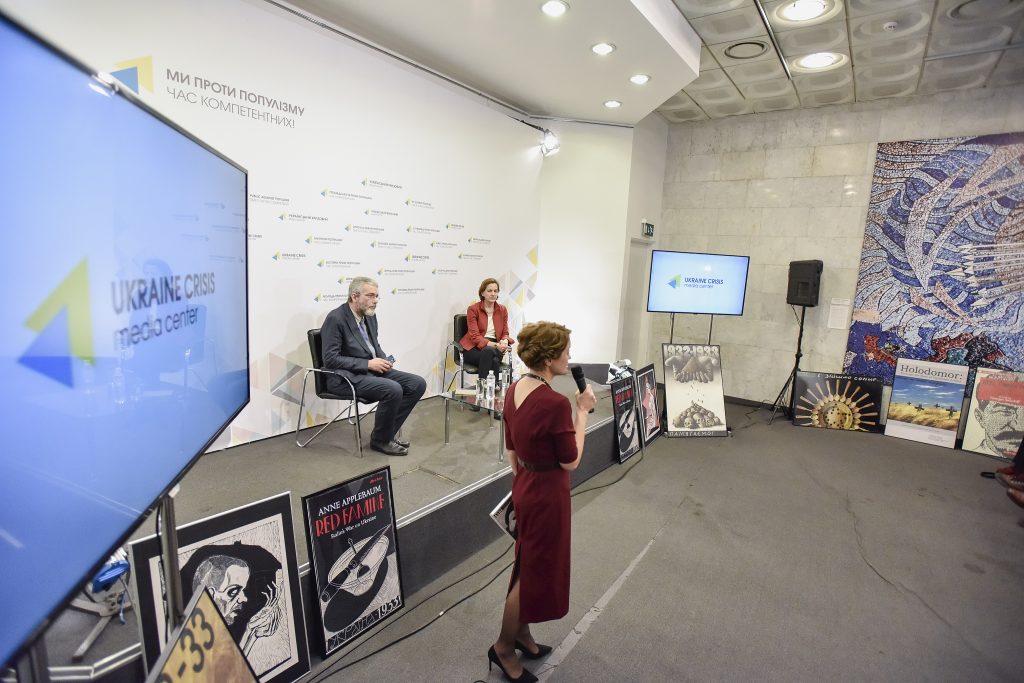
Andriy Kulykov: We see here some pictures from the collections of Morgan Williams and his paintings and posters – an artistic explanation of what was happening. Were there any feature works that have influenced you, prompted you to pay closer attention to this? Or was it just a scientific assessment of the need to tell the truth about this period?
Anne Applebaum: I had read about famine before I read Robert Conquest book years ago. I have a long standing interest in Ukraine, and I was in Lviv in 1990, and in my very first book, a travel book, a sort of journalism work, I describe Western Ukraine in the period before Ukrainian independence or at the moment when Ukraine is becoming independent in 1991. So, a long standing interest in the region. And I think Ukraine plays a very important geopolitical role – a stable and prosperous and successful Ukraine is an important guarantee of a stable prosperous and successful Central Europe. I know that not everyone in the West sees it that way. But I think it is very important for Europe to have good neighbors. And so my interest in Ukraine and in Ukraine becoming a responsible and credible and integrated European country also has to do with my interest in Central Europe as a whole. So I have kind of a broader interest in Ukraine, which led me to be interested I the subject. It was not just about the famine.
Andriy Kulykov: Some people who still cherish the memory of Stalin and who say that he was “a great leader of a great country” might say: “Yes, there was a famine, though Stalin maybe overlooked the danger. And if he ever was to blame for what was happening in Ukraine in early 30s, then he redeemed himself, because he was instrumental in creating Ukraine in the shape that it is now: more lands, and the territory of Ukraine as it is now was Stalin’s creation”. What would you say to this?
Anne Applebaum: I think that is very shortsighted and narrow way of understanding of what national success means. Is national success the size of your country or the strength of national institutions and the prosperity and the wellbeing of your people? And Stalin’s impact on not just the peasantry, but intellectual and political leadership of the country was so devastating, it’s hard for me to understand how you could in any kind of historical balance not see how damaging he was.
Andriy Kulykov: Coming back to a quote from your publication in, I guess it was Daily Telegraph, on February 21: “This is a war or a conflict which neither of the sides can win with weapons”. What then is the way to win the war and how has it transformed since early 2014?
Anne Applebaum: In the very long term Ukraine will win this war by being a nation and state whose institutions are perceived to be just and fair by Ukrainian citizens. A country that inspires patriotism, admiration, which has neutral public servants on who work on behalf of the state, which has not been captured by one political party or another. It will win the war if it is economically strong, if it is a country admired both at home and abroad. Of course, it needs to defend itself, but more importantly, it needs to inspire its own citizens. And that’s really how you will win this war.
My point about the Russian war against Ukraine from the begging was that it is a civilizational war, it’s about what kind of country Ukrainians want to live in, it’s about what kind of state this is going to be. This is not even about democracy, it’s about justice: is this going to be a country that is perceived by people as just and the organs of the state are respected, or is it going to be an autocratic oligarchy like Russia. Winning that war is winning a war of ideas, not just military conflict.
